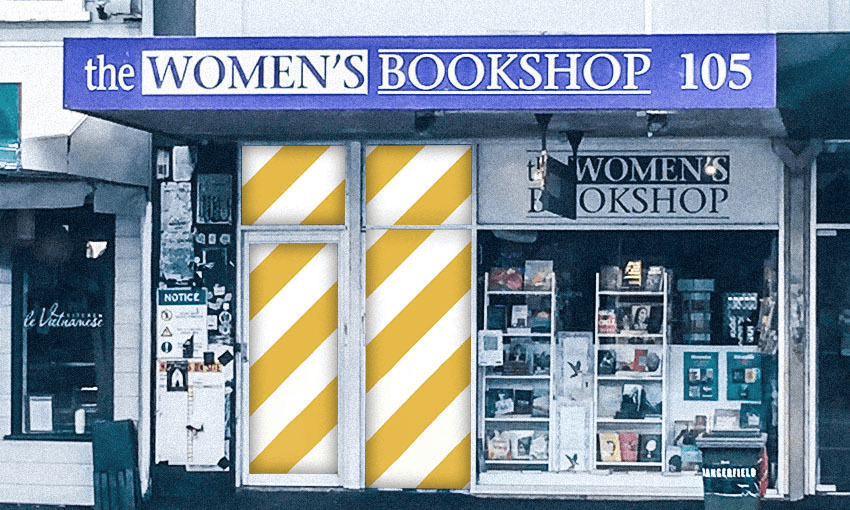Selling books during lockdown can be safe and we were told doing so would be considered essential. So why are we in this shambles again? The publisher of Massey University Press makes her case.
Most evenings after dinner in this interminable lockdown I find myself up on sad, shuttered Ponsonby Road on a walk. On my dutiful trudge I can’t avoid pausing to look in the window of The Women’s Bookshop. The display doesn’t change; there are no new posters up advertising a forthcoming book launch. Like all bricks and mortar retail sites right now in Auckland, it’s suspended, waiting for that level drop from four to three so that staff can go in and fulfill online orders.
But there is a key difference. Many retailers are still operating online, and have been since the start of lockdown, selling you products that the Ministry of Business Innovation and Employment has evidently deemed essential. Like doughnuts. Or yoga mats. Or the new Allbirds socks. Or sex toys from Peaches and Cream. Or $250 Japanese wooden bath stools from Everyday Needs. But not books.
The painful thing about standing in front of The Women’s Bookshop is that publishers and authors have been here before, in last year’s level four lockdown, during which New Zealand was the only country in the English-speaking world to forbid the sale of all books to consumers.
It was painful for us then, and it’s painful now. Five weeks ago all publishers and bookshops were enjoying brisk August sales and looking forward to the busy Father’s Day market of early September, during which books for dads like Matt Chisholm’s Imposter and Gregor Paul’s Steve Hansen The Legacy and Clarke Gayford’s Fish of the Day would have rocked out of the shops. It all came to a screaming halt on August 18.
For me as the publisher at Massey University Press the immediate fallout is the lost sales of the last two weeks of August and then the postponement of the releases of our four terrific books for September. Local publishers will get their New Zealand books out next week, at level 3, when our warehouse can open, and what a relief that will be. But it will be bittersweet given that many opportunities have been lost. And August books will never regain their lost momentum.
That’s because a book, although in one sense a manufactured product, is not like, say, a jar of jam. Jam is jam, at any time, but books have a slot. Publishers decide the time of year that’s best for them and construct media opportunities, author tours, author appearances at writers festivals and so on, around that. Miss your slot and it’s hard to recover because there are a whole lot more books arriving hard on your heels.
How did this inability to trade online happen? The Publishers Association of New Zealand (PANZ), of which my press is a member, swung into action after lockdown 2020 and lobbied MBIE hard over books being classified as essential. The PANZ argument, put in conjunction with the New Zealand Society of Authors, was that books are essential for psychological and intellectual wellbeing. (We all know there is only so much screen time and Netflix adult brains can take. We know that children and teenagers are spending hours and hours each day on online learning and then on social media with their friends. We know this is harmful.)
And PANZ argued that it was safe. Distributors could get the books out of their warehouses with one staff member on site, and bookstore owners, alone in their stores fulfilling online orders, could do so safely.
The argument about safety was accepted at the highest level. In March this year the deputy chief executive of the Covid 19 Response Group, which sits within the Department of Prime Minister and Cabinet, advised PANZ that, yes, at any future level four freight could be received and distributed and a retailer working alone in a premise would be permitted to fulfill online orders.
But come August 18, only some educational books were on the essentials list on the MBIE website. One senior publisher told me that this felt like a betrayal. I can accept that delta changed everything but the book sector was poleaxed by this decision. And if delta really did change everything, please refer to doughnuts, yoga mats, socks, sex toys and Japanese bathroom stools above.
But we box on. It’s got perfectly silly lately. Bookstores south of the border opened for online sales at level three and are now fully operational at level two but the many New Zealand independent publishers with a warehouse in Auckland can’t supply them when they run out of stock of any of our titles. The Auckland bookstores have to stand by and watch their colleagues from the Waikato south trading. That must hurt. And of course those behemoth disruptors and stealers of income from New Zealand commerce, Amazon and Book Depository, are still flying books in.
We can’t be doing this again. I don’t ever want to see The Women’s Bookshop – or any bookshop – closed up and in darkness. Too many livelihoods are at stake and too many adults and children are deprived of the solace, stimulus, excitement and escape that a book can provide at a time of great stress and isolation.
I hope someone in government is listening.

